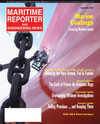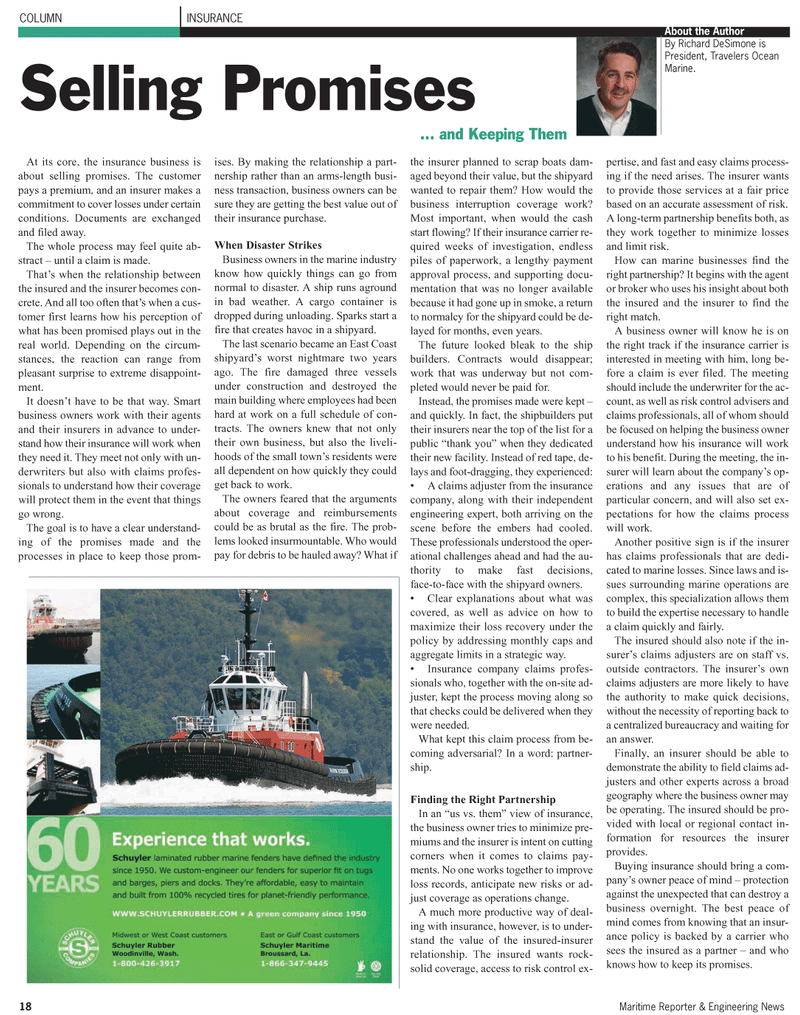
Page 18: of Maritime Reporter Magazine (September 2010)
Marine Propulsion Edition
Read this page in Pdf, Flash or Html5 edition of September 2010 Maritime Reporter Magazine
18 Maritime Reporter & Engineering News
At its core, the insurance business is about selling promises. The customer pays a premium, and an insurer makes a commitment to cover losses under certain conditions. Documents are exchanged and filed away.
The whole process may feel quite ab- stract – until a claim is made.
That’s when the relationship between the insured and the insurer becomes con- crete. And all too often that’s when a cus- tomer first learns how his perception of what has been promised plays out in the real world. Depending on the circum- stances, the reaction can range from pleasant surprise to extreme disappoint- ment.
It doesn’t have to be that way. Smart business owners work with their agents and their insurers in advance to under- stand how their insurance will work when they need it. They meet not only with un- derwriters but also with claims profes- sionals to understand how their coverage will protect them in the event that things go wrong.
The goal is to have a clear understand- ing of the promises made and the processes in place to keep those prom- ises. By making the relationship a part- nership rather than an arms-length busi- ness transaction, business owners can be sure they are getting the best value out of their insurance purchase.
When Disaster Strikes
Business owners in the marine industry know how quickly things can go from normal to disaster. A ship runs aground in bad weather. A cargo container is dropped during unloading. Sparks start a fire that creates havoc in a shipyard.
The last scenario became an East Coast shipyard’s worst nightmare two years ago. The fire damaged three vessels under construction and destroyed the main building where employees had been hard at work on a full schedule of con- tracts. The owners knew that not only their own business, but also the liveli- hoods of the small town’s residents were all dependent on how quickly they could get back to work.
The owners feared that the arguments about coverage and reimbursements could be as brutal as the fire. The prob- lems looked insurmountable. Who would pay for debris to be hauled away? What if the insurer planned to scrap boats dam- aged beyond their value, but the shipyard wanted to repair them? How would the business interruption coverage work?
Most important, when would the cash start flowing? If their insurance carrier re- quired weeks of investigation, endless piles of paperwork, a lengthy payment approval process, and supporting docu- mentation that was no longer available because it had gone up in smoke, a return to normalcy for the shipyard could be de- layed for months, even years.
The future looked bleak to the ship builders. Contracts would disappear; work that was underway but not com- pleted would never be paid for.
Instead, the promises made were kept – and quickly. In fact, the shipbuilders put their insurers near the top of the list for a public “thank you” when they dedicated their new facility. Instead of red tape, de- lays and foot-dragging, they experienced: • A claims adjuster from the insurance company, along with their independent engineering expert, both arriving on the scene before the embers had cooled.
These professionals understood the oper- ational challenges ahead and had the au- thority to make fast decisions, face-to-face with the shipyard owners. • Clear explanations about what was covered, as well as advice on how to maximize their loss recovery under the policy by addressing monthly caps and aggregate limits in a strategic way. • Insurance company claims profes- sionals who, together with the on-site ad- juster, kept the process moving along so that checks could be delivered when they were needed.
What kept this claim process from be- coming adversarial? In a word: partner- ship.
Finding the Right Partnership
In an “us vs. them” view of insurance, the business owner tries to minimize pre- miums and the insurer is intent on cutting corners when it comes to claims pay- ments. No one works together to improve loss records, anticipate new risks or ad- just coverage as operations change.
A much more productive way of deal- ing with insurance, however, is to under- stand the value of the insured-insurer relationship. The insured wants rock- solid coverage, access to risk control ex- pertise, and fast and easy claims process- ing if the need arises. The insurer wants to provide those services at a fair price based on an accurate assessment of risk.
A long-term partnership benefits both, as they work together to minimize losses and limit risk.
How can marine businesses find the right partnership? It begins with the agent or broker who uses his insight about both the insured and the insurer to find the right match.
A business owner will know he is on the right track if the insurance carrier is interested in meeting with him, long be- fore a claim is ever filed. The meeting should include the underwriter for the ac- count, as well as risk control advisers and claims professionals, all of whom should be focused on helping the business owner understand how his insurance will work to his benefit. During the meeting, the in- surer will learn about the company’s op- erations and any issues that are of particular concern, and will also set ex- pectations for how the claims process will work.
Another positive sign is if the insurer has claims professionals that are dedi- cated to marine losses. Since laws and is- sues surrounding marine operations are complex, this specialization allows them to build the expertise necessary to handle a claim quickly and fairly.
The insured should also note if the in- surer’s claims adjusters are on staff vs. outside contractors. The insurer’s own claims adjusters are more likely to have the authority to make quick decisions, without the necessity of reporting back to a centralized bureaucracy and waiting for an answer.
Finally, an insurer should be able to demonstrate the ability to field claims ad- justers and other experts across a broad geography where the business owner may be operating. The insured should be pro- vided with local or regional contact in- formation for resources the insurer provides.
Buying insurance should bring a com- pany’s owner peace of mind – protection against the unexpected that can destroy a business overnight. The best peace of mind comes from knowing that an insur- ance policy is backed by a carrier who sees the insured as a partner – and who knows how to keep its promises.
COLUMN INSURANCE
Selling Promises ... and Keeping Them
About the Author
By Richard DeSimone is
President, Travelers Ocean
Marine.

 17
17

 19
19
